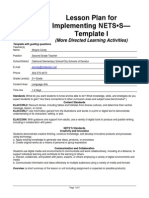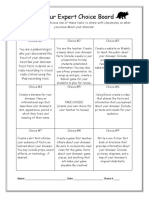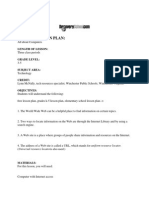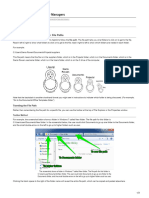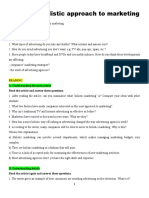Young People, ICT and E-Safety: A Guide For Parents and Carers
Young People, ICT and E-Safety: A Guide For Parents and Carers
Uploaded by
JK EduNotesCopyright:
Available Formats
Young People, ICT and E-Safety: A Guide For Parents and Carers
Young People, ICT and E-Safety: A Guide For Parents and Carers
Uploaded by
JK EduNotesOriginal Description:
Original Title
Copyright
Available Formats
Share this document
Did you find this document useful?
Is this content inappropriate?
Copyright:
Available Formats
Young People, ICT and E-Safety: A Guide For Parents and Carers
Young People, ICT and E-Safety: A Guide For Parents and Carers
Uploaded by
JK EduNotesCopyright:
Available Formats
Young People,
ICT and E-Safety
A guide for Parents and Carers
For young people today, Information and Communication Technology
(ICT) has become an integral part of their everyday life. It offers great
opportunities to further their research when doing homework and school
work.
It is also great fun! They can play games and keep in touch with friends
and family. However, just as any other new technology, there are pitfalls
and they need the tools to help them develop the skills to keep safe.
2 Young People, ICT, and E-Safety
This guide explains:
How young people are using ICT in school page 4
Benefits of using ICT at home page 5
Using the Internet safely at home page 6
Top tips for using the internet safely page 9
Websites offering further information and advice page 10
A Guide for Parents and Carers 3
How young people are using ICT in school
ICT is taught as a subject in its own right but also supports student’s learning in other subjects, including
English and Mathematics.
Uses of ICT in School
O Word Processing to write essays or letters.
O Databases to record information.
O Spreadsheets to create tables, charts and graphs.
O Desktop Publishing to design posters and leaflets.
O Multimedia Presentation to present text, pictures and sound.
O Internet to access research for project work.
O Email to contact other students within the school and teachers.
O Digital Cameras to record what they have done in class or on a field trip.
O Website Publishing to create their own websites.
O Access to VLEs (Virtual Learning Environments), where students can upload homework, and work on
shared projects.
4 Young People, ICT, and E-Safety
Benefits of using ICT at home
Many studies have looked at the benefits of having access to a
computer and the Internet at home. Here are some of the key
findings:
O used effectively, ICT can improve children’s achievements
O using ICT at home and at school develops skills for life
O students with supportive and involved parents and carers do
better at school
O using ICT provides access to a wider and more flexible range of
learning materials
O improves their ICT skills and makes learning more fun
O offers them choice in what they learn and how they learn it
O supports homework and revision
O improves the presentation of their work
O connects learning at school with learning at home.
All this can lead to better performance at school and an improved standard of work.
A Guide for Parents and Carers 5
Using the Internet safely at home
Whilst many Internet Service Providers offer filtering systems to
help you safeguard your child at home, it remains surprisingly
easy for children to access inappropriate material including
unsuitable texts, pictures and movies.
Parents are advised to set the security levels within Internet
Explorer with this in mind. Locating the computer in a family area,
not a bedroom, will enable you to supervise children as they use
the Internet. However, don’t deny your child the opportunity to
learn from the wide variety of material and games available on the
Internet. Instead discuss with them some simple rules for keeping
them safe and make sure they understand their importance.
To keep safe, they should:
O use websites recommended by teachers and use student friendly search engines
O be aware of who created a website and possible bias within information
O only email people they know
O exercise caution before opening an email sent by someone they don’t know.
6 Young People, ICT, and E-Safety
:-) :-( :-) :-(
Social Networking Sites and Chat Rooms
These sites are where young people can create personalised pages, chat to friends, and
share information, videos and photographs. The most common ones are Facebook, Bebo
and MySpace.
O Internet chat rooms should be used with caution - know how to block unwanted users.
O Never give out a home address, phone or mobile number.
O Never email your school name or a picture in school uniform (even to a friend).
O Never arrange to meet anyone alone, and always tell an adult first.
O Only use a webcam with people you know.
O Only accept people as friends who you know.
O Be aware of and use the privacy settings on social networking sites.
O Be careful of what photos and videos you post on line. Everyone who has access to
their profile will be able to see and read everything you post.
Encourage them to tell you immediately if they see anything they are unhappy with or feel
threatened by. If you feel that this is serious, contact your child’s school, the police or
report to the Child Exploitation and Online Protection Centre (CEOP).
A Guide for Parents and Carers 7
Text Messaging
For more and more young people, their mobile phone is part of their
everyday life. For their safety, they need to apply the same rules as when
using Social Networking Sites.
Photographs taken on mobiles can be forwarded to hundreds of people
within minutes. Do they want so many people accessing an embarrassing
photo?
Remind your child to take care when taking and sending photographs.
Cyber Bullying
Bullying can take many forms and, with new technology, it is easier to upset
and threaten others anonymously. The bullies can send unpleasant text
messages, threatening e-mails and post comments and photos to social
networking sites.
If your child experiences any of these, do not delete them. Contact your
child’s school or, if you think necessary, report them to the police.
8 Young People, ICT, and E-Safety
Top Tips for using the Internet safely ...
O Keep the computer in the family room.
O Allow filtering within your Internet Safety Providers Settings. Consider using
further filtering/monitoring software.
O Discuss with your child what they are doing online.
O Use child-friendly search engines (see page 11).
O Get your child to speak to a trusted adult if they see anything that upsets
them or makes them uncomfortable.
O Never give out personal information such as your address or telephone
number.
O Think before sending photos by mobile phone or posting to social networking
sites.
O Use the Privacy settings on social networking sites.
O Use the links in this leaflet for further advice.
A Guide for Parents and Carers 9
Using these Top tips...
O Discuss them with your child and keep them near the computer.
O Check the Internet sites which they are visiting by clicking on History and Favourites.
O Create a dialogue and a relationship of mutual respect as far as the Internet is concerned.
10 Young People, ICT, and E-Safety
Websites offering further information and advice
O BECTA O Cybermentors O Think U Know
www.becta.org.uk www.cybermentors.org.uk www.thinkuknow.co.uk
O CEOP O DCSF
www.ceop.gov.uk www.parentscentre.gov.uk
O Childnet International O Internet Watch Foundation
www.childnet-int.org www.iwf.org.uk
Child-friendly search engines
O Ask Kids O Kidsclick
www.askkids.com www.kidsclick.org
O Cant U Find O Yahoo Kids
www.cantufind.com http://kids.yahoo.com
A Guide for Parents and Carers 11
We can give you this information in any other way, style or language that
will help you access it. Please contact us on 01332 716924
Minicom 01332 716709 or Fax 01332 716920
Polish
Punjabi
Urdu
Derby City Council, Children and Young People’s Department,
Middleton House, 27 St Mary’s Gate, Derby DE1 3NN
Tel: 01332 711224 Fax: 01332 716920 Minicom: 01332 716709
www.derby.gov.uk
You might also like
- 7472 Project2 ExampleDocument24 pages7472 Project2 ExampleTara StewartNo ratings yet
- GSU CIED 7601 Summer 2020 Brittany LordDocument4 pagesGSU CIED 7601 Summer 2020 Brittany LordBrittany LordNo ratings yet
- Compute IT PDFDocument36 pagesCompute IT PDFJK EduNotesNo ratings yet
- Cyberbullying Lesson PlanDocument5 pagesCyberbullying Lesson Planapi-311062970No ratings yet
- Curriculum Integration AssignmentDocument4 pagesCurriculum Integration Assignmentapi-423859962No ratings yet
- Mega Conference Program 2019Document30 pagesMega Conference Program 2019api-286077776No ratings yet
- Vocab Choice Board - InductionDocument1 pageVocab Choice Board - Inductionapi-484244399No ratings yet
- Sped 277 Udl Lesson Plan FinalDocument2 pagesSped 277 Udl Lesson Plan Finalapi-322155616No ratings yet
- Practical Grade 3 PDFDocument135 pagesPractical Grade 3 PDFJK EduNotes0% (1)
- Cambridge Primary Maths (0845) Curriculam SyllabusDocument3 pagesCambridge Primary Maths (0845) Curriculam SyllabusJK EduNotes100% (6)
- Cyber SafetyDocument8 pagesCyber Safetyapi-287948052No ratings yet
- Cyber SafetyDocument18 pagesCyber Safetyapi-315200018100% (1)
- Final Lesson PlanDocument11 pagesFinal Lesson Planapi-300064060No ratings yet
- Sample Cyberbullying WorksheetsDocument10 pagesSample Cyberbullying WorksheetsMyriam PitrelliNo ratings yet
- Cyber Safety For Students New PDFDocument8 pagesCyber Safety For Students New PDFSANTANU GHOSHNo ratings yet
- 21st Century Literacy SkillsDocument6 pages21st Century Literacy SkillsJA Loayon BeberinoNo ratings yet
- Cellular Respiration Choice BoardDocument3 pagesCellular Respiration Choice Boardapi-527942434No ratings yet
- Gamification and Game-Based LearningDocument17 pagesGamification and Game-Based LearningHammad AliNo ratings yet
- Finley TechnologystandardsDocument2 pagesFinley Technologystandardsapi-534620515No ratings yet
- Lesson Plan Usages of Computers and Internet - Grade 2Document5 pagesLesson Plan Usages of Computers and Internet - Grade 2api-256013766No ratings yet
- Lessonplantemplate-Iste CordyDocument5 pagesLessonplantemplate-Iste Cordyapi-253462692No ratings yet
- k-5 Syllabus Computer LiteracyDocument3 pagesk-5 Syllabus Computer Literacyapi-233290122No ratings yet
- Rubric PDFDocument2 pagesRubric PDFAtila HunoNo ratings yet
- Final Project Edu 214 Crystal SmithDocument18 pagesFinal Project Edu 214 Crystal Smithapi-543074057No ratings yet
- Reading Practice Computers Worksheet v2Document2 pagesReading Practice Computers Worksheet v2kls1100No ratings yet
- 18 Ict Policy For Education NamibiaDocument30 pages18 Ict Policy For Education Namibiaapi-426693562100% (1)
- Principles of Blended Learning: Shared Metacognition and Communities of InquiryFrom EverandPrinciples of Blended Learning: Shared Metacognition and Communities of InquiryNo ratings yet
- ICT PolicyDocument10 pagesICT Policystcronans100% (1)
- Go To PageDocument4 pagesGo To PageKeith CalhounNo ratings yet
- ICT SYLLABUS Compressed PDFDocument40 pagesICT SYLLABUS Compressed PDFkyabanji ibrahimNo ratings yet
- Iste ChecklistDocument1 pageIste Checklistapi-510571866No ratings yet
- CyberbullyingDocument20 pagesCyberbullyingapi-306214880No ratings yet
- Eei Technology Lesson PlanDocument3 pagesEei Technology Lesson Planapi-285995221100% (1)
- Educational Technology ResourcesDocument11 pagesEducational Technology Resourcesapi-398411756No ratings yet
- Science Fair Project: By: Maria Casas CSN Education Department, EDU 214 April 25, 2020Document7 pagesScience Fair Project: By: Maria Casas CSN Education Department, EDU 214 April 25, 2020Maria CasasNo ratings yet
- Flipped Classroom Lesson PlanDocument2 pagesFlipped Classroom Lesson PlanAmos Landers IINo ratings yet
- Assignment 3 Edu 214Document3 pagesAssignment 3 Edu 214api-522797512No ratings yet
- Grade 3 StandarsDocument4 pagesGrade 3 StandarsAnna GonNo ratings yet
- Smart School ReportDocument13 pagesSmart School ReportZubaidah TaringNo ratings yet
- 8463 SwotDocument6 pages8463 Swotapi-256874805No ratings yet
- Tpack Template Creating Lesson Plan 1Document3 pagesTpack Template Creating Lesson Plan 1api-366475403No ratings yet
- Udl Lesson Plan 2Document5 pagesUdl Lesson Plan 2api-314445039No ratings yet
- Professional Development AnalysisDocument13 pagesProfessional Development Analysisapi-513928230No ratings yet
- Actfl 21st Century Skills Meet Technology InfographicDocument1 pageActfl 21st Century Skills Meet Technology Infographicapi-239376704No ratings yet
- Website Designing Template Based On ADDIE Model (AutoRecovered)Document3 pagesWebsite Designing Template Based On ADDIE Model (AutoRecovered)Sha ShaNo ratings yet
- Sample Teacher - Classroom Teacher Evaluation Rubric - Probationary Reporting 2017-18Document23 pagesSample Teacher - Classroom Teacher Evaluation Rubric - Probationary Reporting 2017-18api-383588513No ratings yet
- Dinosaur Choice BoardDocument9 pagesDinosaur Choice Boardapi-417558685No ratings yet
- Lesson Plan - All About ComputersDocument7 pagesLesson Plan - All About ComputersKara CastilloNo ratings yet
- Educational Technology SlidesDocument22 pagesEducational Technology SlidesMUJEEB RAHIMAN KATTALI0% (1)
- Tpack Lesson Plan Audrey ParcellDocument3 pagesTpack Lesson Plan Audrey Parcellapi-475189056No ratings yet
- Ict Scope and Sequence FinalDocument5 pagesIct Scope and Sequence Finalapi-327614617No ratings yet
- Itgs Lesson Plan Week 22bDocument2 pagesItgs Lesson Plan Week 22bapi-2937697310% (1)
- Homeroom GuideDocument239 pagesHomeroom Guideapi-131051550No ratings yet
- 2014 UdlDocument16 pages2014 UdlRoziah Md AminNo ratings yet
- Literacy Development PaperDocument6 pagesLiteracy Development Paperapi-488912445No ratings yet
- 21 ST Century Skills and Digital LiteracyDocument5 pages21 ST Century Skills and Digital LiteracyDaouda ThiamNo ratings yet
- #Flip HuntDocument1 page#Flip HuntHallie FentonNo ratings yet
- ITEC Lesson Plan Format: Common Core Standard Wyoming State StandardDocument3 pagesITEC Lesson Plan Format: Common Core Standard Wyoming State Standardapi-608746021No ratings yet
- 18021-Closing Achve Gap Backgrndr 7-FINAL PDFDocument11 pages18021-Closing Achve Gap Backgrndr 7-FINAL PDFBulirSamuderaNo ratings yet
- Writing Goals and ObjectivesDocument23 pagesWriting Goals and ObjectivesEmmanuel Herrera VillariñaNo ratings yet
- Bullying, Related Problems and the "Stupid" Professor: Learning Disability Help, #4From EverandBullying, Related Problems and the "Stupid" Professor: Learning Disability Help, #4No ratings yet
- Worksheet 04, Yr 9, FlowchartDocument3 pagesWorksheet 04, Yr 9, FlowchartJK EduNotes100% (1)
- File & Folder Management 03Document3 pagesFile & Folder Management 03JK EduNotesNo ratings yet
- File & Folder Management 02Document3 pagesFile & Folder Management 02JK EduNotesNo ratings yet
- Desktop M70q G3Document10 pagesDesktop M70q G3JK EduNotesNo ratings yet
- ICT StorageDocument21 pagesICT StorageJK EduNotesNo ratings yet
- Year 8 MathsDocument31 pagesYear 8 MathsJK EduNotesNo ratings yet
- ICT Workbook Y7 01Document120 pagesICT Workbook Y7 01JK EduNotesNo ratings yet
- Flowchart NotesDocument7 pagesFlowchart NotesJK EduNotesNo ratings yet
- Worksheet 01, Yr 9, ICTDocument3 pagesWorksheet 01, Yr 9, ICTJK EduNotes100% (1)
- Cloud Computing PDFDocument11 pagesCloud Computing PDFJK EduNotesNo ratings yet
- Notes, DB IntroDocument33 pagesNotes, DB IntroJK EduNotesNo ratings yet
- Cambridge Primary Check Point InfoDocument22 pagesCambridge Primary Check Point InfoJK EduNotes100% (2)
- 1.4 Types of Computer: ICT IGCSE Theory - Revision PresentationDocument6 pages1.4 Types of Computer: ICT IGCSE Theory - Revision PresentationSiva Benin S100% (1)
- Computer Performance & Storage DevicesDocument38 pagesComputer Performance & Storage DevicesJK EduNotesNo ratings yet
- Basic Computer Components: Unit 2Document15 pagesBasic Computer Components: Unit 2JK EduNotesNo ratings yet
- Igcse 9 1 Grading FactsheetDocument2 pagesIgcse 9 1 Grading FactsheetJK EduNotesNo ratings yet
- Primary Checkpoint Math 0842 June 2010 Paper 1Document12 pagesPrimary Checkpoint Math 0842 June 2010 Paper 1JK EduNotes75% (4)
- Ks3 Ict - Data - QuizDocument4 pagesKs3 Ict - Data - QuizJK EduNotesNo ratings yet
- Mark SchemeDocument9 pagesMark SchemeAliaAl-MamariNo ratings yet
- ComputeIT Teacher-Pack SampleDocument26 pagesComputeIT Teacher-Pack SampleJK EduNotes100% (1)
- An Introduction To Theory U - Online Course: Presencing Global ClassroomDocument8 pagesAn Introduction To Theory U - Online Course: Presencing Global ClassroomJohn MichaelNo ratings yet
- Sustainability 10 01466 PDFDocument18 pagesSustainability 10 01466 PDFCătălina RaduNo ratings yet
- LS6 - Digicit - SG05 (V1.1)Document18 pagesLS6 - Digicit - SG05 (V1.1)als midsayap1100% (1)
- Impact of Social Media On Students Academic PerformanceDocument26 pagesImpact of Social Media On Students Academic PerformanceGodstimeNo ratings yet
- Diagnostic Test Media and Information LiteracyDocument2 pagesDiagnostic Test Media and Information Literacyearl vann urbano100% (2)
- Test Bank For Introduction To Electronic Commerce 3EDocument13 pagesTest Bank For Introduction To Electronic Commerce 3EAbdullaNo ratings yet
- UNIT 1: A Holistic Approach To Marketing: Before You Read Discuss These QuestionsDocument26 pagesUNIT 1: A Holistic Approach To Marketing: Before You Read Discuss These QuestionsHồng Anh Nguyễn100% (1)
- ApenDocument11 pagesApenearl9rivera-830280No ratings yet
- Effective of Sociap MediaDocument9 pagesEffective of Sociap MediaMohamed HussienNo ratings yet
- Social Media and Their Affordances For Organizing-A Review and Agenda For Research 2016Document39 pagesSocial Media and Their Affordances For Organizing-A Review and Agenda For Research 2016Yeonie KimNo ratings yet
- Chapter 3Document23 pagesChapter 3Jemima LopezNo ratings yet
- Privacy and Security in Online Social Media. ASSIGNMENTDocument7 pagesPrivacy and Security in Online Social Media. ASSIGNMENTArsh RupainwarNo ratings yet
- Iolea,+320303 Castillo Caro AlmansaDocument16 pagesIolea,+320303 Castillo Caro Almansafitria.yuniarti08No ratings yet
- Social Media and Political ParticipationDocument11 pagesSocial Media and Political Participationalexd441No ratings yet
- SHARING TOURISM Through Social Media PDFDocument9 pagesSHARING TOURISM Through Social Media PDFIrina GrevtsovaNo ratings yet
- HCM Taleo PDFDocument57 pagesHCM Taleo PDFShravanUdayNo ratings yet
- (9-1) Igcse Ict Chapter 8Document4 pages(9-1) Igcse Ict Chapter 8rahimuddinNo ratings yet
- Flight From ConversationDocument2 pagesFlight From ConversationJerico EdulanNo ratings yet
- Artical 1Document13 pagesArtical 1THU HUYNH MINHNo ratings yet
- Essay #2 Social Media-4Document6 pagesEssay #2 Social Media-4mariNo ratings yet
- Facebook Usage and Communication Skill of Grade 11 Student of Sta. Cruz National High School - Senior High SchoolDocument14 pagesFacebook Usage and Communication Skill of Grade 11 Student of Sta. Cruz National High School - Senior High SchoolRomeo Cayog PonsicaNo ratings yet
- Determining Influential Users in Internet Social Networks: Michael Trusov, Anand V. Bodapati, and Randolph E. BucklinDocument17 pagesDetermining Influential Users in Internet Social Networks: Michael Trusov, Anand V. Bodapati, and Randolph E. BucklinBudianduk BoonganNo ratings yet
- Impact of Social Media On Brand Loyalty Papr 16Document16 pagesImpact of Social Media On Brand Loyalty Papr 16Ahmed100% (1)
- Ucsp - Lesson 9Document24 pagesUcsp - Lesson 9Andrea IbañezNo ratings yet
- HT Muslim Millennial Travel Report 2017Document46 pagesHT Muslim Millennial Travel Report 2017Najma Qolby JuharsyahNo ratings yet
- Business Pla1Document11 pagesBusiness Pla1Varsha VenkateshNo ratings yet
- Singapore's Razor-Sharp Internet Television Network: Media Programme Asia WWW - Kas.de/mediaasiaDocument7 pagesSingapore's Razor-Sharp Internet Television Network: Media Programme Asia WWW - Kas.de/mediaasiaNaziehah HattaNo ratings yet
- The Use of Facebook and Its Influence To Marketing Strategy in Bachelor of Science in Business Administration Student in Kolehiyo in SubicDocument23 pagesThe Use of Facebook and Its Influence To Marketing Strategy in Bachelor of Science in Business Administration Student in Kolehiyo in SubicJess AvillaNo ratings yet
- Reading and Writing Q1 - M9Document13 pagesReading and Writing Q1 - M9ZOSIMO PIZONNo ratings yet
- Responses To COVID-19 in Higher Education: Social Media Usage For Sustaining Formal Academic Communication in Developing CountriesDocument18 pagesResponses To COVID-19 in Higher Education: Social Media Usage For Sustaining Formal Academic Communication in Developing CountriesTIPAY, EMELIE L.No ratings yet





















